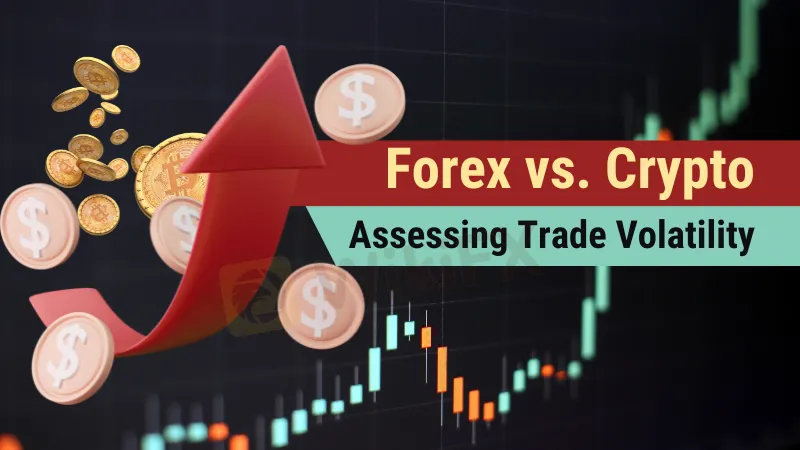简体中文
繁體中文
English
Pусский
日本語
ภาษาไทย
Tiếng Việt
Bahasa Indonesia
Español
हिन्दी
Filippiiniläinen
Français
Deutsch
Português
Türkçe
한국어
العربية
Forex vs. Crypto: Assessing Trade Volatility
Abstract:Stay ahead of the curve with the latest news on Forex and cryptocurrency markets. Unravel the intricacies of volatility factors and learn essential strategies for successful trading. Keep yourself informed and ready for the ever-changing financial landscape.

Forex and cryptocurrency are two industries that have excited investors worldwide in the ever-changing financial markets. Both markets have distinct possibilities and problems, notably in terms of trade volatility. This research will examine the intricacies of both markets using simple language to retain accessibility while optimizing for top search searches and including targeted keywords. Our objective is to provide a thorough perspective that will assist investors in navigating these difficult environments.
Understanding the Forex Market Dynamics.
Forex, the global market for exchanging national currencies, has high liquidity, with an average daily trading volume of $6 trillion in 2019. Because of the huge liquidity, massive transactions may be conducted with little influence on market price, resulting in lesser volatility in contrast to smaller markets. However, Forex is not impervious to volatility. Economic indicators, interest rate changes, and geopolitical events can all cause large movements.
Forex Volatility: Key Factors to Consider
Several reasons contribute to volatility in the forex market:
Economic indicators like employment, GDP, and consumer expenditure can trigger dramatic market reactions.
Central Bank Policies: The Federal Reserve of the United States and the European Central Bank may use interest rates and monetary policy to cause volatility.
Political instability, elections, and conflicts can alter currency prices.
Exploring Volatility in Cryptocurrencies
Cryptocurrency, digital or virtual money that secures itself via encryption, has emerged as a new frontier in financial markets. Unlike the Forex market, cryptocurrency prices, such as Bitcoin and Ethereum, can change dramatically over short periods.

Reasons for Volatility in the Crypto Market
News, social media, and speculation drive investor sentiment, which affects the cryptocurrency market.
Price changes may result from regulatory announcements about cryptocurrency laws in various regions.
Crypto markets are smaller than Forex markets, therefore deals may have a higher impact on market values, increasing volatility.
Volatility in Forex and Crypto: A Comparison
Forex market volatility is driven by economic fundamentals and geopolitical events, which can be examined and forecasted. Cryptocurrency market volatility is more dependent on speculative trading and mood, resulting in more unexpected and rapid price changes.
Dealing With Market Volatility
Understanding and handling the volatile nature of these markets is critical for investors. Traditional Forex research approaches like fundamental and technical analysis may be used to anticipate market moves. Although bitcoin research is possible, the market's volatility requires risk management strategies like diversification and stop-loss orders.
Conclusion
The Forex market is more stable due to economic data and regulations, while the cryptocurrency market is volatile due to market mood and speculation. Investors must understand these markets' dynamics, plan strategically, and manage risk to navigate the complexity of Forex and crypto trading.
Are you ready to increase your Forex market knowledge and trading strategies? Visit WikiFX Forex Education for vast materials for beginners and experts. Explore in-depth articles, incisive insights, and practical advice to help you navigate the Forex market with confidence. Begin your path to becoming a more informed and professional Forex trader right now.

Disclaimer:
The views in this article only represent the author's personal views, and do not constitute investment advice on this platform. This platform does not guarantee the accuracy, completeness and timeliness of the information in the article, and will not be liable for any loss caused by the use of or reliance on the information in the article.
Read more

Trading Opportunities During the Lunar New Year: Forex, Commodities, Stocks
The Lunar New Year is a time for celebrations in many countries, especially in Asia. It is also a period when markets can see different trends and movements. Traders can use this time to explore new opportunities, especially in forex, commodities, and equities listed on Bursa Malaysia, the stock exchange of Malaysia.

Unlocking the Secrets of Prop Trading: How to Succeed in Proprietary Trading Firms
In this article, we’ll explore what prop trading is, the benefits and challenges it presents, and the strategies that can help you thrive in proprietary trading firms.

Participate Now in ForexCup Trading Championship
FXOpen announced the trading competition called ForexCup Trading Championship 2025 for traders. You can join, trade, and compete for exciting prizes. Here are the details

What the Movie Margin Call Taught Traders About Risk and Timing
The 2011 film Margin Call offers a gripping portrayal of the early hours of the 2008 financial crisis, set within a Wall Street investment firm. While the film is a fictionalised account, its lessons resonate strongly with traders and finance professionals. For one trader, watching the film had a lasting impact, shaping how they approached risk, decision-making, and the harsh realities of the financial world.
WikiFX Broker
Latest News
Why More Traders Are Turning to Proprietary Firms for Success
Unlocking the Secrets of Prop Trading: How to Succeed in Proprietary Trading Firms
What the Movie Margin Call Taught Traders About Risk and Timing
Top Forex Brokers for Low-Cost Trading in 2025
Participate Now in ForexCup Trading Championship
Musk team given access to sensitive federal payment system - reports
Trading Opportunities During the Lunar New Year: Forex, Commodities, Stocks
Currency Calculator






